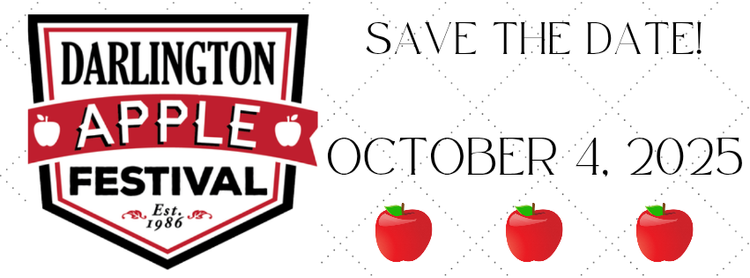THE HISTORY OF THE DARLINGTON APPLE FESTIVAL
The Apple Festival has always been a celebration of the character and pride of the Darlington Community. Even before the idea was first conceived, Darlington was the home of community-spirited people who responded to the needs of its schools, churches and citizens. Then, in 1986, three well-intended Darlington locals with an entrepreneurial bent, Art Johnson, June Griffith and Tommy McCurry thought up the AppleFest. In the years before the first Applefest, the Darlington United Methodist Church held a spring strawberry festival as a fundraiser and a time to bring good friends together. They eventually morphed the spring strawberry event to a fall apple event. Meanwhile, the Darlington Country Store was holding a fall festival. It seemed like a good idea to combine the two events into a glorious day.
The first exploratory meeting was held in the winter of 1985. Not only was the idea of a community apple festival enthusiastically received, buy many ideas for projects were initiated. Other local churches and non-profits were invited to join in. Scheduled for the first Saturday in October in “downtown Darlington”, about a thousand visitors showed up. There was an applesauce eating contest, an “Apple Bingo”, and lots of good pie-a-la-mode to eat. A string of light bulbs was set up in the evening and there was a square dance in the parking lot.
Each year the festival has grown with new attractions and new organizations joining in. Still, it is organized by an all volunteer group of individuals. The Darlington Apple Festival is incorporated as a non-profit and only hopes to break even and have working capital for the next year. The major expenses are insurance, transportation, sanitation and security. It operates as an annual fund raising venue for organizations and individuals that make up the food, craft and farm vendors.
How important is the Darlington Apple Festival to the local economy? We asked the churches and non-profit organizations for which the Apple Festival was originally designed. We learned that it has become a line item in their budgets and accounts for up to 50% of some budgets. For these organizations, the money that comes in flows right back out into the community. The school PTA counts on this money to supplement services to children. Local churches count on the revenue to support a wide variety of outreach and service that would otherwise not be affordable. Local organizations, such as the Lion’s Club, report that they would not be able to support the community as much as they do without the Apple Festival income.

